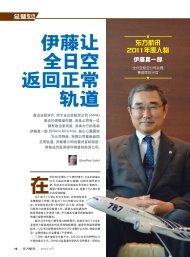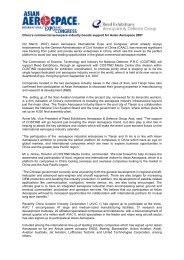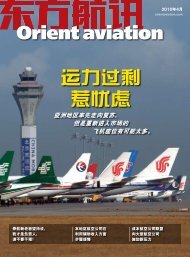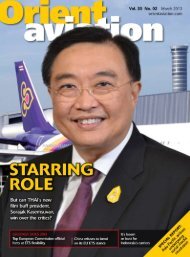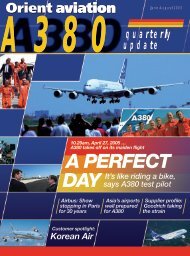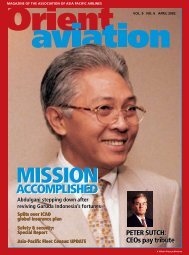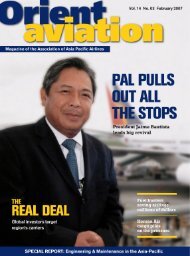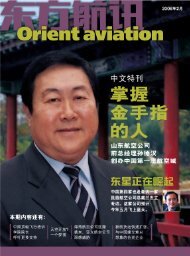LIFE AFTER SQ006 - Orient Aviation
LIFE AFTER SQ006 - Orient Aviation
LIFE AFTER SQ006 - Orient Aviation
- No tags were found...
You also want an ePaper? Increase the reach of your titles
YUMPU automatically turns print PDFs into web optimized ePapers that Google loves.
By Jonathan SharpThe scheduled arrival in March of aGulfstream IV at Metrojet Ltd marks animportant step – but by no means thelast – for the Hong Kong company as it positionsitself to take advantage of what it seesas major opportunities for business aviation.Mark Turner, managing director of MetrojetLtd and Heliservices (HK) Ltd, said Metrojetwill operate the 11-seat Gulfstream for theU.S. manufacturer, but with the aim of sellingit in the next 15 months. He thinks he canfind a Hong Kong buyer. “That’s not to say wehave somebody in line waiting to buy it.” Aswell as managing the jet, Metrojet is qualifiedto perform maintenance on it and will put itout to charter at about US$6,000 an hour.Established in 1995 as part of the KadoorieGroup, Metrojet has been flying aHawker 700 that it bought as a means toacquire an Air Operator’s Certificate and toset up a flight operations department so asto establish credibility as an aviation managementcompany.“But our Hawker is not the aircraft tointroduce to the local market because it istoo small. When you introduce an aircraft to apotential client you want one that has all theleading-edge technology and the bells andwhistles as well as the comfort and room thatthey have grown accustomed to.”Metrojet’s next step, to reorganize thecompany to bring greater efficiencies, isimminent, Turner said. “We are trying to bea bit more efficient because we think we areat the start of some really good opportunitiesfor business aviation.”He said Hong Kong regulatory authoritieshad previously not provided a welcomingenvironment for business aviation. This waspartly because of space constraints at the oldKai Tak airport. This had meant there was agood chance a private plane would have todrop off passengers in Hong Kong and thenfly somewhere else to wait for the returnleg because there was no room to park atKai Tak.Those constraints disappeared with the1998 opening of the new Hong Kong InternationalAirport at Chek Lap Kok, includingan extensive Business <strong>Aviation</strong> Centre withMetrojet as a shareholder. However, as otherregional operators agree, constraints persistin neighbouring mainland China in the formof restricted access and high cost.But attitudes are changing. “The importantthing with regard to regulatory authorities,whether we are talking about Hong Kongor the mainland, is that there has been aNew airportopens the wayfor MetrojetMark Turner, managing director of MetrojetLtd and Heliservices (HK) Ltd: some reallygood opportunitiesfor business aviationsignificant adjustment in attitudes towardsbusiness aviation,” said Turner.“On the mainland they recognise that(business aviation) is a means of bringingpeople into the country that can contributeto the development of the country and it’s intheir best interest to facilitate this.”Turner said Hong Kong’s problem wasthat Beijing still treated it as a foreign countryfor aviation purposes, despite the 1997handover of sovereignty by Britain.He said it costs Metrojet over US$8,000in fees and ground service charges to fly theHawker to Beijing. “For my competitor, whois based in Beijing, for him to fly around andinto Beijing costs him $26. No zeros.”When that operator flew to Hong Konghe paid just the same fees to land in the territoryas Metrojet. The upshot was the Beijingoperator can fly to Hong Kong empty, pick uppassengers for Beijing, return them to HongKong and fly home empty at lower cost thanMetrojet just flying Hong Kong-Beijing-HongKong.“So the playing field is not level. As aHong Kong company we are offended bythe fact that we are treated exactly like U.S.,British, Australian or any other entities. Weare an SAR (Special Administrative Regionof China), but we don’t get any credit or recognition.”To add insult to injury, the Beijingoperator can fly any route he chooses in themainland whereas Metrojet must fly designatedroutes sometimes hundreds of mileslonger. These are the hurdles that we have toget over for this really to prosper in the waywe know it can.”To help overcome these and other hurdles,Turner has been a prime mover in theformation of the Asian Business <strong>Aviation</strong> Association(ABAA), which met in June last yearin Hong Kong and at the Zhuhai air show inmainland China in November.Development of the ABAA is “probablythe most important thing that operators cando for themselves,” said Turner. “We’ve got alot of momentum,” he said, plus support fromfellow professional bodies.Metrojet: operating an 11-seat Gulfstream jet for the U.S. manufacturerMarch 01 | <strong>Orient</strong> <strong>Aviation</strong> | 47



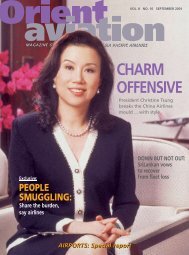
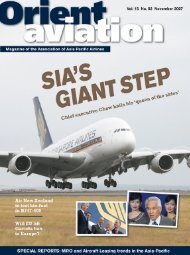
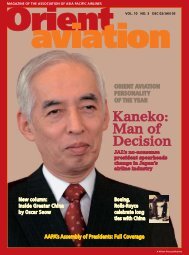
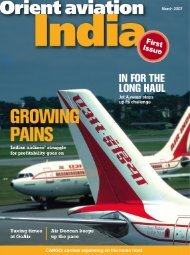
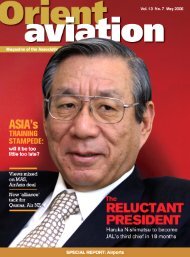
![OAMag-V7N4-Cover [Converted] - Orient Aviation](https://img.yumpu.com/48598575/1/190x255/oamag-v7n4-cover-converted-orient-aviation.jpg?quality=85)
